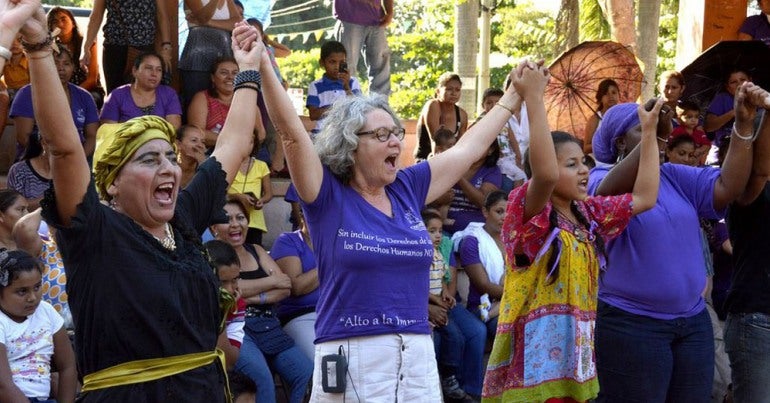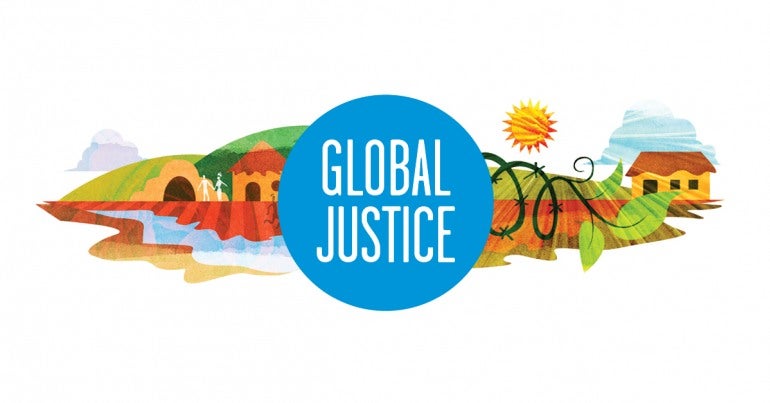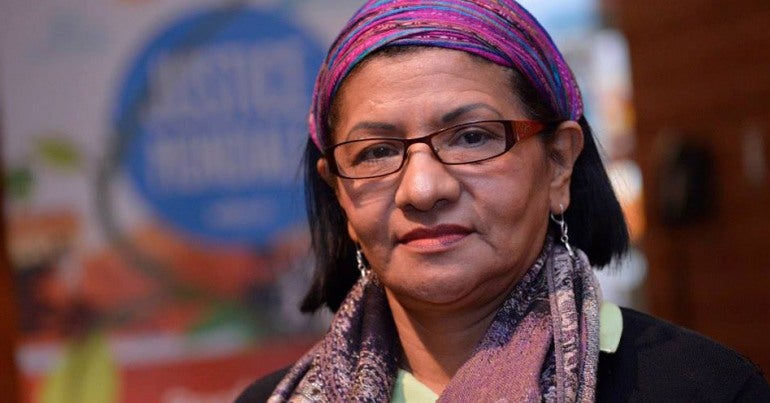21st Conference of the Parties (COP21) of the United Nations Framework Convention on Climate Change (UNFCCC)
PARIS 2015
Events in Paris in 2015 captured the world’s attention. The signing of the climate change agreement, referred to as the Paris Agreement, is considered by some as a defining moment for the world that affirms a universal commitment to challenge climate change and to limit global warming to well below 2°C with a global vision for 1.5°C.
CUPE sent a delegation to Paris in December 2015 to participate with the global trade union movement in the negotiations and discussions related to the climate crisis. The Paris Agreement is not as strong as trade unionists wanted, as it falls short of calling for a new review of Greenhouse Gas (GHG) targets by all countries before 2020 to stop warming in excess of 2°C. Others in civil society, including a significant and powerful indigenous peoples’ contingent, were more critical and called the Paris Agreement a mechanism to facilitate the privatization and commodification of the land and environment by falsely suggesting market based schemes are the solution to address climate change.
Brother Charles Fleury, CUPE national secretary-treasurer, spoke at the Canadian Labour Congress forum entitled Trade Union Forum on Climate Jobs about the critically important role of the public sector in the production of energy and in the transition toward energy production that is 100 per cent renewable. A Just Transition, where the importance of providing new, good jobs through social equity that includes racialized workers and communities was the focus of the trade union movement.
Canada was one of only a few countries to support the concept of a Just Transition, and now must fulfill the Paris Agreement by making ambitious national plans before 2020. How this unfolds will largely depend on the resolve of civil society and unions to put this on the political agenda of governments.
11th PSI Inter-American Regional Conference
Mexico City 2015
The Public Service International Inter-American Regional Conference (IAMRECON) takes place every five years with PSI affiliates attending from North, Central and South America and the Caribbean. CUPE participated in the 2015 conference in Mexico City under the banner: Advancing with trade union rights in the fight for quality public services.
A series of activities and meetings preceded the conference itself including sector and issue-based meetings. CUPE’s participation included presentations and union reports to the energy, education, municipal, health and water sector meetings; the women, racism and xenophobia and LGBT meetings; and the trade and investment, pension and climate change meetings.
The IAMRECON consists of pre-conference meeting reports, country and regional briefings, and deliberations on several resolutions and a five-year plan of action. At CUPE’s initiation, PSI adopted a resolution that committed the global union federation, to:
- Register strong opposition to Bill C-51 the Anti-Terrorism Act, 2015, by writing to the Prime Minister of Canada and the Cabinet outlining the very real dangers to freedom of speech, assembly, human rights, and democracy posed by the Bill;
- Support all efforts of the labour movement in Canada to oppose the Anti-Terrorism Act by responding to urgent calls for letters, emails and exposure through social media networks;
- Actively support the labour movement and civil society groups in Canada who share our concern that anti-terror legislation is being used as a tool to silence legitimate dissent to government policy, it disproportionally targets minority and marginalized communities; and it threatens to undermine our solidarity as workers.
Solidarity in Bangladesh
DHAKA 2015
When you think of Bangladesh, the disaster at Rana Plaza may be the first thing that comes to mind. On April 24, 2013, a factory building on the outskirts of Dhaka collapsed, killing over 1,100 workers and injuring over 2,500 more. Canadians were appalled to find that familiar brands such as Joe Fresh, an off-shoot of Loblaws, had been sourcing from a factory where conditions were so bad that workers were beaten to go back to work after cracks had been seen appearing in the walls and ceiling.
The truth that Canadian consumers, all over the global north, had to face was that workers in faraway Bangladesh were paying the price for our cheap clothing. There are approximately 4.2 million workers employed by the Ready Made Garment’s industry in Bangladesh.
CUPE participated in a recent trade union delegation to Bangladesh with trade unionists from the Public Service Alliance of Canada (PSAC), Unifor, United Steelworkers (USW) and the Canadian Labour Congress. We were hosted by our partner organization the Bangladesh Center for Worker Solidarity (BCWS) who facilitated meetings with workers, organizers and activists, and provided us with the opportunity to hear firsthand about the conditions under which they work.
Most of the millions of people working in this sector are young women from rural Bangladesh. Once they find themselves in the city, work in the RMG industry is often the only option for them. Workers in Bangladesh have been considered expendable, and their right to organize into unions is rarely respected by employers.
Transnational brands, including Joe Fresh, H & M, Adidas and the Children’s Place, have been paying some attention to the structural safety of the factories from which they source the cheap clothing they sell but they do not do any more than they are legally required to.
Bangladeshi workers and activists were clear with us that they do not want boycotts of the industry. What they want is support and solidarity for their organizing. We need to stand in solidarity with those fight-ing to ensure RMG factory workers in Bangladesh have safe working conditions, decent wages and benefits and access to the services they need to live their lives with dignity. We continue to do this by supporting their efforts to organize and through our engagement with the Canadian and Bangladesh governments around trade policy and the development of building safety and workers’ rights.
Frontlines Tour
Colombia 2015
The trade union rights situation in Colombia continues to be dire. The unionization rate in the country is only three to four per cent with constant attacks on union rights. CUPE participated in a delegation to Colombia called the Frontlines Tour in 2015 and in the 12 days we were in the country, two Colombian trade unionists were killed. Colombia persists at being the most dangerous place to be a trade unionist.
The Frontlines Tour is a joint Colombian solidarity project of four national public sector unions – the Canadian Union of Public Employees (CUPE), the Canadian Union of Postal Workers (CUPW), the Public Service Alliance of Canada (PSAC), and the National Union of Public and General Employees (NUPGE). We initiate delegations to Colombia in solidarity with the trade union and social movements.
Buenaventura is known for being the most violent city in Colombia and is the site of the most important port in the Pacific and therefore a place where the impact of several Free Trade Agreements are dramatically felt. Through CUPE’s partnership with NOMADESC, we were able to visit with several Afro-Colombian community leaders and members of communities in and around Buenaventura.
Members of one community we met live in simple wooden homes, on stilts at the water’s edge. They survive by fishing and clam digging, and are fiercely attached to their territories where their families have lived for over 200 years. As a result of free trade agreements, including one with Canada, the government is planning a massive expansion of the port of Buenaventura. There is also a highway expansion project through several Afro-Colombian communities underway. The past few years have seen an increase in violence, including assassinations.
Indigenous communities we met with are fighting for their territories and rights. There are 102 Indigenous nations in Colombia, representing 1.3 million people. They have been disproportionately affected by the armed conflict in the country because natural resources are located on their land. It was reported that 70 per cent of their land has been or is in the process of being given to mining companies (including Canadian companies) without any prior consultation. The communities are concerned about the impact on water, medicinal plants, their livelihoods and their sacred sites.
Participation in this delegation provided an important opportunity to witness firsthand the struggle of the Colombian people and the importance of CUPE’s ongoing solidarity work in Colombia.
60th Session of the United Nations Commission on the Status of Women (csw60)
New York City 2016
CUPE joined 160 trade unionists from 34 countries at the 60th session of the United Nations Commission on the Status of Women (CSW60) in New York City in March.
We were struck by the shared struggles of workers in Canada and the global south, and we learned about differences too. Judy Taguiwalo from ACT-Philippines, a CUPE partner, spoke about the connection between working conditions and learning conditions in schools, both undermined by colonialism, patriarchy and global capitalism. Kalpona Akter of the Bangladesh Centre for Worker Solidarity, another CUPE partner, described organizing 1,500 workers in her factory at the age of 16.
Many delegates linked gender rights and struggles against colonialism, racism, ableism, homophobia and other systems of oppression. Allison Julien of the Domestic Workers Alliance traced the exclusion of domestic workers from US labour protections to the legacy of slavery. Delegates in a session on Arab Women and the Human Right to Peace drew lines between foreign intervention, Islamophobia and conflicts in the Middle East and North Africa (MENA) region.
While delegates connected across social movements, marginalized women face barriers to participating in CSW60.
A highlight of the week was the #JusticeForBerta rally where hundreds gathered to protest the recent murders of Indigenous environmental activists in Honduras. CUPE has joined the international call for an indepen-dent investigation and protection of human rights defenders who remain at risk. Berta Cáceres and hundreds of other murdered human rights defenders did the dangerous work of defending land against powerful mining, infrastructure, agriculture and hydropower interests.
Sister Brittany Lambert, member of CUPE 2722 at Oxfam, and Sister Irene Jansen, CUPE Senior Equality Officer, attended on behalf of CUPE National.
PSI/AFSCME Leadership meeting: Protecting the public interest from predatory privatization and out-sourcing
Washington, D.C. 2015
The impact of austerity and privatization has been severe all over the world. Public Services International (PSI) held a meeting of international labour union leaders in December 2015 in Washington D.C. to develop an agreement on ways to strengthen the fight against the global push for privatization.
Participants to the meeting included CUPE and labour leaders from the United States, Canada, Mexico, Argentina, Brazil, Germany, Austria, Spain, Sweden, Norway, Ghana, Uganda, South Africa, Australia, New Zealand and Japan. Of particular interest were the diverse strategies and tools used by trade unions around the world to fight back.
It is important that we approach privatization in a systematic way and employ strategies and tactics that change depending on whether we are targeting trade unionists, the broader public, politicians and legislators, the finance sector or the media.
The meeting also included sessions with officials from the International Monetary Fund (IMF), World Bank (WB) and from the United States departments
of Treasury, Labor, and State.
Many options for potential collective actions were proposed, union leaders strongly emphasized that we need to focus on achievable and targeted priorities. Labour leaders committed to strengthen the capacity of PSI and affiliates and to campaign against privatization in the coming months.
Trans-Pacific Partnership (TPP)
Mexico City 2016
Labour and civil society groups, including CUPE, joined activists and legislato rs from across the Americas in January 2016 in Mexico City to step up the fight against the massive Trans-Pacific Partnership (TPP) trade deal.
The far reaching TPP covers 12 countries that represent 40 per cent of global trade. Like all free trade deals, the TPP gives rights and protection to the world’s richest corporations, while workers and the environment lose more ground. The deal will expand privatization, drive down wages and increase the cost of health care and education. It will further limit a government’s ability to protect its citizens or the environment, and gives corporations the right to sue national governments if a policy decision interferes with their profit margin.
Coming out of Mexico City, civil society groups from across the Americas have launched a coordinated action plan focusing on four areas: education, mobilization, lobbying and legal challenges.
Mobilization in Chile, Peru and the US is already starting to bear fruit. With the massive job losses and rising inequality in the wake of NAFTA, as well as the 2005 defeat of the Free Trade Agreement of the Americas as a backdrop, there is a strong resolve to bring the TPP fight to the next level.
The deal was officially signed by the Canadian Government in February 2016 without the full and rigorous consultation the Liberals promised during the election campaign. The TPP still needs to be ratified by Parliament and there is growing momentum to push the government to reject the ratification.
PSI North America sub-regional meeting
Ottawa 2016
Throughout the Americas workers and their families are facing major challenges in their working and daily lives. There are increasing attacks on trade union rights and especially public sector trade union rights. These attacks have been experienced in every country in the Americas – large and small.
PSI affiliates from Canada and the US met for two days to discuss the changing conditions in our respective unions and countries, and focused our discussion on labour rights, free trade agreements, privatization, tax justice and anti-corruption.
A presentation about pension fund investment in infrastructure and P3s generated a dynamic discussion about the contradictions we face when fighting for members’ pension benefits, which in many cases are in turn invested in projects we do not support, such as P3s in Canada and around the world.
Uganda National Grandmothers’ Gathering
Entebbe-Uganda 2015
Hundreds of grandmothers from across Uganda came together for the country’s first National Grandmothers’ Gathering in October 2015. The gathering was considered an unprecedented opportunity for older women diversely affected by HIV and AIDS to voice their experiences, share their innovative strategies for responding to the pandemic, and collectively lay claim to constitutionally-protected rights too often denied.
The Ugandan grandmothers were joined by grandmother delegations from Kenya and South Africa, as well as 22 Canadian grandmothers representing thousands of members of the Stephen Lewis Foundation Grandmothers to Grandmothers Campaign. The Stephen Lewis Foundation delegation included CUPE National Representatives Sister Veriline Howe and Sister Daria Ivanochko, managing director of national services.
For the first two days of the gathering, the grandmothers met in workshops, to rigorously discuss the difficult issues affecting them and their communities. On the final day they mobilized in the streets of Entebbe, demanding access to education, health care, land, legal representation, and freedom from violence and theft. The Ugandan Grandmothers’ Statement was released at the end of the day calling on government, the private sector, civil society, media, UN Agencies and members of the international community to support their collective vision for a future in which their grandchildren and communities are thriving, and have left the ravages of AIDS behind.











